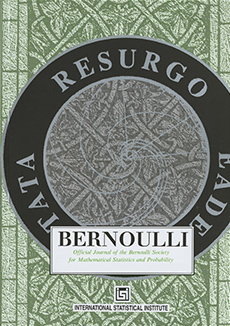Abstract
We consider a sequence of random variables ($R_n$) defined by the recurrence $R_n = Q_n + M_nR_{n−1}, n ≥ 1$, where $R_0$ is arbitrary and ($Q_n, M_n), n ≥ 1$, are i.i.d. copies of a two-dimensional random vector ($Q, M$), and ($Q_n, M_n$) is independent of $R_{n−1}$. It is well known that if $E \ln|M| < 0$ and $E \ln^+|Q| < ∞$, then the sequence ($R_n$) converges in distribution to a random variable $R$ given by $R\stackrel d=\sum_{k=1}^\infty Q_k\prod_{j=1}^{k-1}M_j$, and usually referred to as perpetuity. In this paper we consider a situation in which the sequence ($R_n$) itself does not converge. We assume that $E \ln|M|$ exists but that it is non-negative and we ask if in this situation the sequence ($R_n$), after suitable normalization, converges in distribution to a non-degenerate limit.
Citation
Paweł Hitczenko. Jacek Wesołowski. "Renorming divergent perpetuities." Bernoulli 17 (3) 880 - 894, August 2011. https://doi.org/10.3150/10-BEJ297
Information





